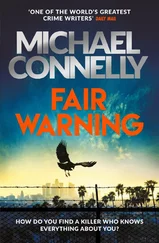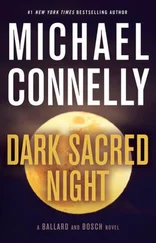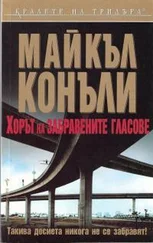“Really? It seems to me that she just got her way.”
“Yes, but we can use Trammel to open the door to Opparizio. Then we destroy her on the stand.”
“So, how much time to prepare?”
“None. Let’s go right at her.”
“Are you sure?”
“I just told Cisco to get Lorna to pull the file on Lisa Trammel. I think we may be able to counter their October surprise with our own little surprise.”
“Good. Tell me more.”
46
I had heard Lisa Trammel’s voice but had not seen her in courtside holding. She was now walked into the courtroom by Deputy Chan. I saw a woman who was almost unrecognizable to me. Her hair had turned gray and was cropped short in a man’s cut. Her paper-white skin seemed to be stretched over her bones, as she looked to be half the weight of the woman I had known and defended a decade before. She wore a baggy orange jumpsuit and had a blurry blue prison tattoo—a line of stars—arching over her left eyebrow. All eyes from the jury were on this curiosity as she stood to be sworn in.
Once Trammel was seated on the witness stand, Dana Berg moved to the lectern and began to draw out her story.
“Ms. Trammel, where do you currently reside?”
“I’m at the Central California Women’s Prison in Chowchilla.”
“And how long have you been there?”
“Uh, six years. Before that, I spent three down at Corona.”
“That’s a prison, too, in Corona?”
“Yes.”
“Why are you incarcerated?”
“I was sentenced to fifteen years for manslaughter.”
“And what were the details of that crime?”
“I killed my husband. It was an abusive relationship and I ended it.”
I was watching the jurors more than I was watching Trammel. How they reacted to her would influence how Maggie would conduct her cross-examination. For the moment, they were attentive, even having just come from lunch. Trammel was enough of a change of pace to keep them interested and alert. I noticed that the Hollywood Bowl chef was leaning forward and sitting at the edge of her seat.
“Are you familiar with the defendant in this case, Michael Haller?” Berg asked.
“Yes, he was my lawyer,” Trammel said.
“Can you point him out for the jury?”
“Yes.”
Trammel pointed at me and for the first time our eyes locked. I saw the hate burning behind hers.
“Can you tell us about that relationship?” Berg asked.
Trammel was slow to break her stare away from me.
“Yes,” she said. “I hired him about eleven years ago to try to save my home. I was a single mother of a nine-year-old son and I had gotten behind on the mortgage and the bank was foreclosing on me. I hired him to help me after I got a flyer in the mail.”
Trammel had come to me during the wave of foreclosures that swept across the country following the 2008 financial crisis. Foreclosure defense was the growth sector in law and I signed on like many other criminal defense lawyers. I made a lot of money, kept several people in their homes, and unfortunately met and agreed to defend Lisa Trammel.
“Did you have a job then?” Berg asked.
“I was a teacher,” Trammel said.
“Okay, and was Mr. Haller able to help you?”
“Yes and no. He delayed the inevitable. He filed papers and challenged the bank’s actions, and he delayed things more than a year.”
“And then what happened?”
“I was arrested. I got accused of killing the man at the bank who was taking away my home.”
“What was his name?”
“Mitchell Bondurant.”
“And were you put on trial for the murder of Mitchell Bondurant?”
“Yes.”
“And who was your attorney?”
“It was him. Haller. The case got a lot of attention. In the press, you know. And he, like, begged me to let him defend me.”
“Do you know why that was?”
“Like I said, the case got a lot of media attention. It was free publicity for him and that was the deal. I didn’t have any money for a lawyer, so I said yes.”
“And the case went to trial?”
“Yes, and I was found innocent.”
“You mean not guilty?”
“Yes, not guilty. By the jury.”
Trammel turned and looked at the jury as she said this last part, as if to say, a jury believed me before and you must believe me now. My eyes scanned down the two rows of jurors—their eyes all on Trammel—and then continued into the crowded gallery. I saw my daughter watching with rapt attention as well.
“Did there come a time when you had a financial dispute with Mr. Haller?” Berg asked.
“Yes, there did,” Trammel said.
“And what was that about?”
“There was a movie producer who had attended the trial and was interested in making a movie about the case. Because of the foreclosure angle, it was a story that spoke to the time and people would be interested, especially because I was innocent, you know?”
“What was the movie producer’s name?”
“Herb Dahl. He had a deal at Archway Pictures, where he brought them projects. He said they were interested in the movie.”
“And how did that become a dispute with Mr. Haller?”
“Well, he told me he wanted to get paid. Halfway through the trial, he said he wanted part of the movie money.”
I slowly shook my head at the lie. It was an involuntary response, not meant for the jury. But Berg noticed and turned her attention from Trammel to the judge.
“Your Honor, could you please instruct Mr. Haller not to make demonstrations distracting to the jury?”
Warfield looked at me.
“Mr. Haller, you know better,” she said. “Please refrain from showing reaction to the testimony.”
“Yes, Your Honor,” I said. “But it’s hard not to react to lies about your—”
“Mr. Haller,” the judge barked. “You know better than to make such a comment as well.”
The judge closed her mouth in a tight line as she probably considered slapping me with a contempt citation. She thought better of it.
“You’ve been warned,” she finally said. “Proceed, Ms. Berg.”
“Thank you, Your Honor,” the prosecutor said. “Ms. Trammel, did Mr. Haller tell you how much money he wanted?”
“Yes,” Trammel said. “A quarter million dollars.”
“And did you agree to pay him that?”
“No. I didn’t have it, and Herb Dahl said I would be lucky to get half of that as an up-front payment from the studio for my story.”
“How did Mr. Haller respond to that?”
“He threatened me. He said there would be consequences if I didn’t pay him what he deserved.”
“What happened next?”
“I was found not guilty and I told him a deal was a deal. He got good publicity for the case, especially when I was found innocent. I said that he would probably get paid when they made a movie because they would need to use his name and what he did at the trial and all.”
“Did he accept that?”
“No. He said that there were consequences and I would be sorry.”
“Then what happened?”
“The police came to my house with a search warrant and they found my husband. He was buried in the backyard. I had buried him after he died. I was afraid that nobody would believe me about the abuse and that I would lose my son.”
Trammel was tearful now. It could be heard in her voice rather than seen on her face. To me it was all an act. A good one. Berg underlined the moment with a strategic pause and I saw the jury watching the witness closely, looks of sympathy on some of their faces, including the Hollywood Bowl chef.
This was an unmitigated disaster.
I leaned toward Maggie and whispered.
“This is so much bullshit,” I said. “She’s an even better con artist now than she was back then.”
Читать дальше
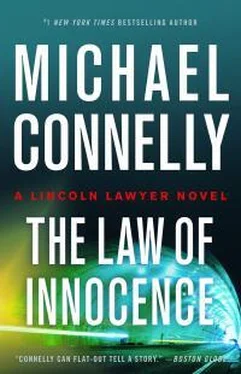
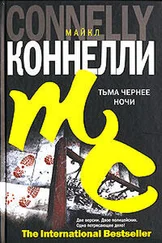



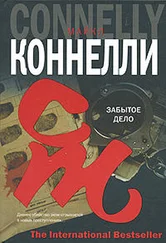

![Майкл Коннелли - Christmas Even [Short story]](/books/390532/majkl-konnelli-christmas-even-short-story-thumb.webp)
